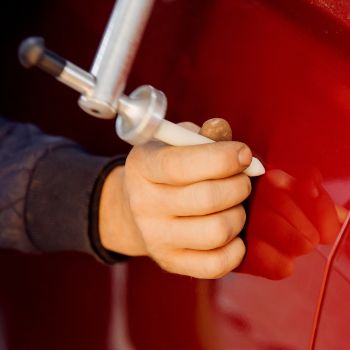PDR works on both new and older vehicles, but it isn’t suitable for every kind of damage. It’s best suited for certain types of dents, so it’s important to understand what PDR can and cannot fix. If you're dealing with a small dent or a minor scratch, this might be the perfect solution for you. Paintless Dent Repair is a technique that allows technicians to fix dents without having to repaint the exterior. Using specialized tools, they carefully manipulate the metal from the backside of the panel, guiding it back into its original shape. This keeps the car’s original paint intact and avoids the need for sanding, painting, or filler. Here are some key benefits of PDR: While PDR isn’t a universal fix, it works well for specific types of damage. You may want to consider PDR if your car has: A qualified technician will assess the dent’s depth, location, and whether any paint was damaged before recommending PDR as a viable option. There are situations where PDR may not be the best choice. Avoid using PDR if: If you’re looking for a fast, affordable, and effective way to fix a minor dent, paintless dent repair could be the right solution. Don’t let a small dent ruin your car’s look—reach out to DaSilva’s Auto Body today for expert paintless dent repair services and bring your vehicle back to its best condition. Solar photovoltaic module frame refers to the fixed frame of aluminum alloy profiles for photovoltaic solar panel components. Because solar photovoltaic modules must guarantee an outdoor service life of about 25 years, the aluminum frame used in solar photovoltaic modules must have good oxidation resistance and corrosion resistance. Generally, the frames used in solar photovoltaic modules are divided into three types: anodic oxidation, sandblasting oxidation and electrophoretic oxidation. Low Profile Solar Panels,Solar Panel Profile,Solar Energy Company Profile,Low Profile Solar Panels For Van Foshan Knilex Aluminum Co., Ltd. , http://www.aluprofilefactory.com Paintless Dent Repair (PDR) is a modern and efficient method of fixing dents without the need for repainting or using fillers. The process involves gently massaging the damaged area from the inside to restore the metal's original shape. This not only improves the car’s appearance but also helps preserve the factory paint, maintain the vehicle’s warranty, and reduce the use of materials compared to traditional methods.
Paintless Dent Repair (PDR) is a modern and efficient method of fixing dents without the need for repainting or using fillers. The process involves gently massaging the damaged area from the inside to restore the metal's original shape. This not only improves the car’s appearance but also helps preserve the factory paint, maintain the vehicle’s warranty, and reduce the use of materials compared to traditional methods.What Is Paintless Dent Repair?
What Can Paintless Dent Repair Fix?
When PDR Is Not Recommended
Is Paintless Dent Repair Right for Your Car?
